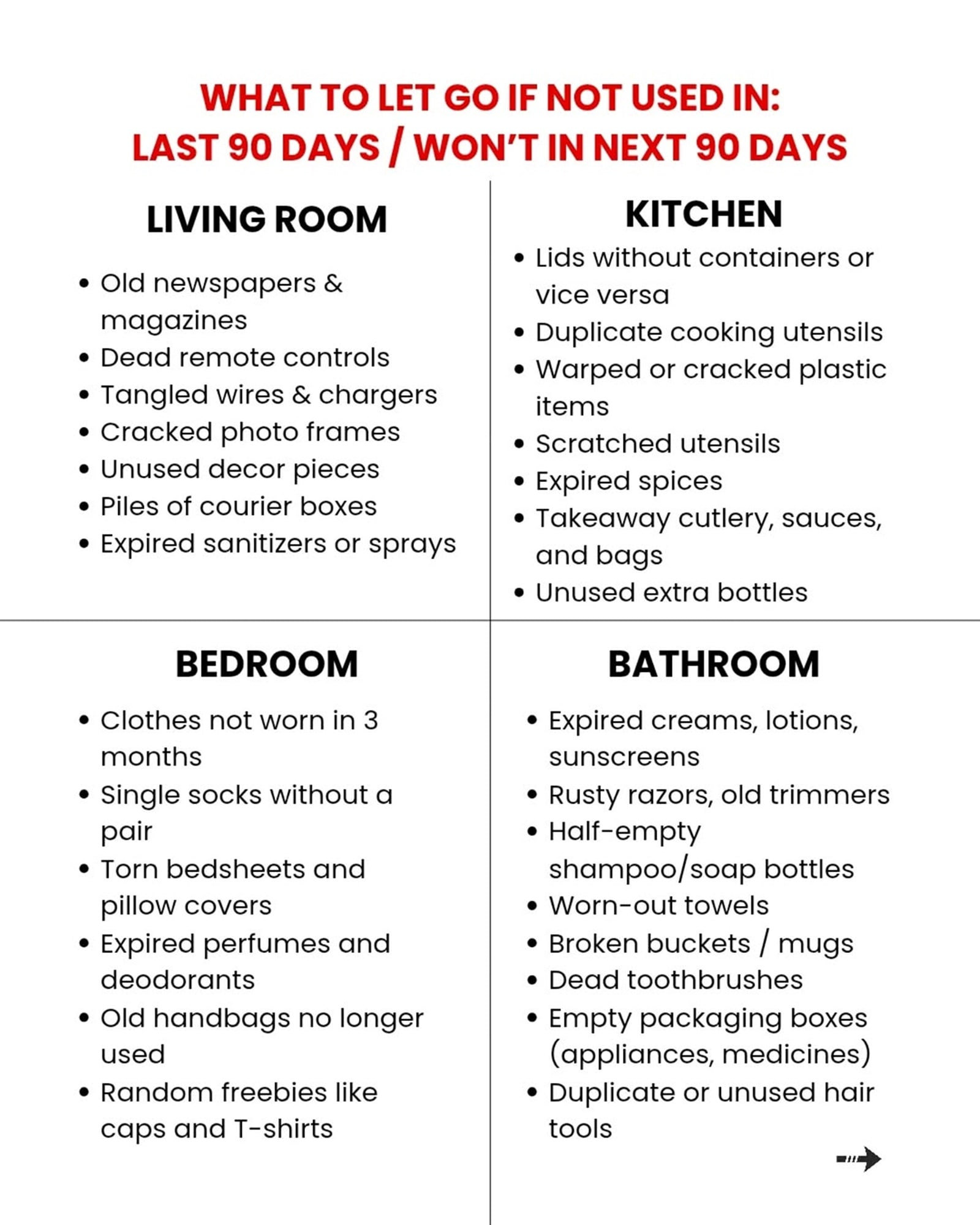📣 For more lifestyle news, click here to join our WhatsApp Channel and also follow us on Instagram
This 90/90 decluttering hack can make your Diwali cleaning ’10x easier’
If you are helping a loved one declutter, maintain a curious, nonjudgmental attitude. Where you might see a box filled with junk, your grandmother might see something filled with toothpick holders and other treasures.
 Diwali decluttering tips for a clean space (Source: Freepik)
Diwali decluttering tips for a clean space (Source: Freepik)Most of us spend hours scrubbing, wiping, and polishing before festivals, but the real mess often comes from things we don’t even use. With Diwali around the corner, we are all gearing up with jhaadus and pochas to scrub our floors spotless. If the idea of decluttering gives you the creeps, here’s a simple 90/90 decluttering rule shared by digital creator Shashank Alshi on Instagram that can make your festive cleaning “10x easier”.
What’s the 90/90 rule?
Pick an item and ask yourself a simple question: “Have I used this in the last 90 days?”
Then ask: “Will I use it in the next 90 days?”
If the answer to both is no, it’s clutter
If the answer to one is yes, keep it.
This rule serves as a quick mental filter, helping you make decisions instantly without overthinking. No guilt. No confusion. Before you start deep cleaning for Diwali, outline a 3-step process:
- Divide your work over 4-5 days to avoid mental overload and confusion.
- Pick a specific part of the house for each day — living room, kitchen, bedroom/s and bathroom/s all on different days.
- Start well in advance. The further you delay, procrastination and laziness set in.
Find it difficult to let go?
Clinical psychologist Priyamvada Tendulkar noted that individuals who struggle to discard old items often suffer from a hoarding disorder. It is a psychiatric condition characterised by an overwhelming urge to save items and difficulty discarding current possessions.
“For adults with ‘clinically severe’ hoarding disorder, this leads to a level of household clutter that impairs daily functioning and can even create a fire hazard,” she said, adding that many adults struggle with clutter even if they do not meet the clinical criteria for hoarding disorder.
 A clean house sets the tone for a calm and festive atmosphere. (Source: Instagram/@alshihacks)
A clean house sets the tone for a calm and festive atmosphere. (Source: Instagram/@alshihacks)
Holding on to things that have sentimental value or could be useful in the future is a natural part of the ageing process. For some people, however, this tendency to hold on to objects intensifies over time, eventually meeting the criteria for hoarding disorder. According to Tendulkar, age-related changes in executive function may explain the increase in prevalence of hoarding disorder. Increasing difficulty with decision-making in general also affects decisions around household clutter.
What can you do about it?
If you find yourself struggling with hoarding old items, she suggested trying out this process:
Start with writing out your values: Every object in your home should feel value-consistent for you.
For example, if tradition and faith are important values for you, you might be more inclined to hold onto a cookbook that was made by the elders at your church and more able to let go of a cookbook you picked up on a whim at a bookstore. If, instead, health and creativity are your core values, it might be more important to hold onto a cookbook of novel ways to sneak more vegetables into your diet.
Defining value-consistent goals for using your space can help to maintain motivation as you declutter. “Are you clearing off your desk so you can work more efficiently? Making space on kitchen counters to bake cookies with your grandchildren? Remember that sometimes your values will conflict,” said the expert. At those moments, it may help to reflect on whether keeping or discarding an object will bring you closer to your goals for the space.
Similarly, remember that values are subjective. When helping a loved one declutter, maintain a curious and nonjudgmental attitude. Where you might see a box filled with junk, your grandmother might see something filled with toothpick holders and other treasures.
If there’s less clutter, you will be done quickly. With more space freed up, it will be easier to decorate with rangolis, diyas and lights. A clean house sets the tone for a calm and festive atmosphere. Less overwhelm means a fresh start.
📣 For more lifestyle news, click here to join our WhatsApp Channel and also follow us on Instagram



- 01
- 02
- 03
- 04
- 05
























